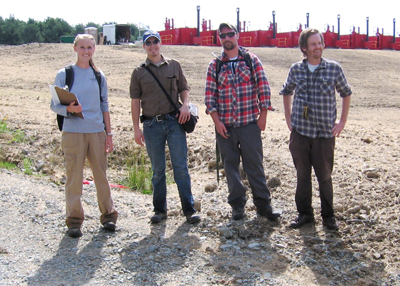The Beaver Run Reservoir Water Quality Testing Project will sample and monitor drinking water quality near Marcellus shale well pad sites for a second year, thanks to a $77,100 contract renewal with the Municipal Authority of Westmoreland County in June. The project taps the expertise of faculty and student researchers from the Departments of Geography and Regional Planning, the Department of Geosciences, and Chemistry.

Students Sierra Davis, Aaron Shaffer, Brian Flick, and Alex Hall are part of the IUP team conducting water monitoring and testing at Beaver Run.
The project, led by Professor Brian Okey, Department of Geography and Regional Planning, and Professor Nathan McElroy, Department of Chemistry, began in June 2011.
Students from Geography and Regional Planning and Geosciences collect measurements and samples from designated sites throughout the wooded area around the reservoir and in the reservoir. McElroy and his chemistry students analyze the water samples. Data are posted online at the project website by Geography and Regional Planning graduate students.
“Authority members wanted to engage an independent third party to conduct water sampling due to the drilling of horizontal Marcellus gas wells adjacent to the reservoir," said Okey. "We were able to formulate a very comprehensive services proposal that successfully addressed the need of the MAWC to be vigilant about monitoring and protecting the water source.”
“This project continues to be a great opportunity to train our students on how to do very relevant work,” he said. “We anticipate this to be a long-term project, as this work will continue to be necessary for many years to come.”
The 1,300-acre reservoir serves approximately 130,000 residents in northern Westmoreland County and small portions of neighboring Armstrong and Indiana counties. Marcellus shale gas wells adjacent to the reservoir have generated public concerns and are one focus of the monitoring effort, which also targets areas impacted by pollution from old mine sites, said Okey.
During the first year, Okey directed students Alyssia Chapman and Jason Wolfe and recent graduates Rob Cerrato and Nick Flanders to collect samples from around well pads, streams going to the reservoir, and the reservoir bottom. Graduate students Brian Flick and Alex Hall were also involved in the first year of the project.
Samples did not detect a threat to the public water supply, although silt from construction activities was observed, Okey said.
Results of the first year of testing are posted at Beaver Run Reservoir Water Quality Testing Project.
For this second year of the project, at least five students will be involved in the collection process, and the number of sites to be sampled has increased. Okey and students also will continue to sample at the bottom of the reservoir and along streams feeding into the reservoir.
Students involved include Sierra Davis, Aaron Shaffer, Hall, and Flick. Graduates Flanders and Chapman also will continue working on the project.